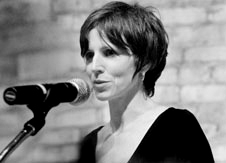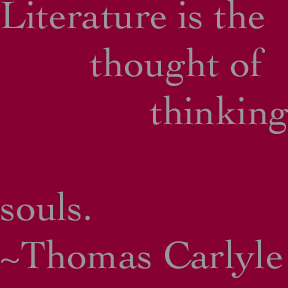Thinking Souls: An Interview with Juliet Patterson
This month's Thinking Souls covers the poetry and writing life of Juliet Patterson, whose "The Truant Lover" was published by Nightboat Books. Read on for Shannon Gibney's interview with Juliet, and respond in Thinking Souls Read, our online book club.


Are poets really dancers or painters who have somehow gotten caught up in words? Or is their identity more spiritual? Are they, as Wallace Stevens claimed, “priests of the invisible”? This month, we talk to Juliet Patterson, author of The Truant Lover (Nightboat Books, 2004), and winner of the Nightboat Poetry Prize, on the meaning of the word “poet,” and the indirect route that many take toward their calling.
SG: Tell my how this book came into being. By your own admission, you don’t have the typical trajectory of a writer. So…I just want to know: Did this come out of you in one night? Or was this years and years of scratching in your small office?
JP: I’d say that it’s about eight years of work in this particular book, although many of the poems that were written in the eight years don’t appear in this book. There was another book that came before this that doesn’t really exist in the world [laughing]. Like a lot of poets, I just kind of go poem by poem by poem. A certain amount of work amasses, and then you try to draw out themes.
I did one other manuscript, which I didn’t think was very successful, and I tried to hone it into a finished product, and I sent it out and nothing happened. So, I decided that I really just needed to practice more. I stopped sending work out, and spent another three years writing. My style shifted a few times in that period. A lot of the work that’s in this book emerged at the tail end of that. I could start to see certain obsessions coming into the foreground.
SG: v Such as?
JP: Certainly, love is a big one. That’s sort of a cliche…More of this idea of how can we truly enact love? How can we talk about it? Where are all the different configurations of it? Like a lot of writers, I guess a big obsession is language itself – its usefulness, and also its inadequacy.
And then, there’s sort of tangential things, like the organ of the eye, and ways of seeing. I got really interested in the anatomy of the eye, and how does one see. What one sees, how does that tie into what you desire, or how you express yourself, or how you speak? How do seeing and talking relate?
SG: Every writer has a process for getting a poem together; what’s yours?
JP: That’s a good question. I’m a pretty big reviser, I guess, but a lot of it’s happening in process. I’m kind of obsessive-compulsive – singular-minded. I have a poem, a poem, and I work on and work on and work on it, until I feel like it’s almost done, until I tire, and then I move onto the next thing. I never have multiple projects or poems going on at one time.
So it could be several hours, or it could be weeks, or months. I have a poem right now that I’ve been working on for four months. It’s not coming together, but I can’t seem to pick up a new thing until this other thing is finished. But that’s just that process. So for that reason, sometimes it can be rather slow. Other people might pick something else up and work, and maybe finish it. Then, by that point, the poem rests for awhile. There might be small ordering changes, word changes. A lot of the editing is happening in process. I’m kind of tight on the reins. I’m always trying to come up with strategies to make myself a little bit looser. Because the poems can be a little bit too contracted, for that reason, because I’m constantly fiddling with it as it comes out. I’m a perfectionist, I guess.
I’m not a very conceptual writer; I don’t really have ideas. Although that’s not always true. It’s just the blank page, and I get an image…or maybe an idea in terms of an abstract concept that I want to explore, but not a specific idea grounded in time. And then it’s just trying to follow the poem far enough to see where it’s going. Mark Doty talks about writing poems – he compares it to wave physics. This idea that you get into a poem, and you just try to ride that wave until it breaks. And then when it breaks, you try to write past that. The breaking point is often where we stop. We often think we’re finished, but we still have to get to shore, somehow.
SG: That sounds like it’s an arduous process, but also a dangerous one. What do you think the job of the poet is?
JP: I like what Wallace Stevens says; he says that poets are the priests of the invisible. Poets – but there are other writers who do this as well – are trying to chase what’s ineffable, what can’t be said. That’s not every poet either, but I guess that’s how I think about it.
I was just talking to somebody about why some people are drawn to poetry, why are some people drawn to prose. There are these generalities about the two entities…although there are some really interesting things happening right now around genre. The boundaries are loosening, and I think that’s positive. I’ve always found it very curious, for example, that we say “poets and writers.” Claudia Rankine’s new book [Don’t Let Me Be Lonely], is kind of this slippery animal, it slides between poems and essay to me, and it’s really brilliant and exciting. So, for me, poetry is about image…and for me, a little less about story, and a little more about trying to get a concentrated impression. But that’s not every poet. For me, it’s just a clearer vehicle for emotion. When I write prose, it’s far more detached, and not as energetic.
I always say that secretly, deep down inside, I’m probably a dancer or a painter, or some other kind of…There would be some other way for me to express myself, but I really fell in love with language at an early age, and I can’t leave it. It’s almost like I’m trying to combine those things. I feel like I’m pushing language in some other direction, away from its limitations. Poetry makes more sense for me in that way.
SG: So do you write prose at all?
JP: [Laughing] A little. I also don’t come from a storyteller family. I’m an only child; somewhere along the line, I fell in love with words. I was read to as a child, but people didn’t tell stories, and we don’t have rituals about family. So, it’s a different mode.
SG: What was your journey as a writer?
JP: I had an amazing teacher in sixth grade, who used to begin each class by reading a poem to us. And that’s all she did – just read us the poem. There was no commentary, there was no analysis, there was just the pure joy of reading poetry. And she was also a professional actress at the Guthrie Theater in the summer, so she had an incredible presence. I think that was my first real introduction to poetry, and I just started reading it, and wanting to write it. So I wrote these poems in sixth grade.
I was a big reader as a kid, and I was always writing. But the poetry was always secret – very confessional and very personal. I pushed it away for a lot of years, and became a journalist; I worked for The Twin Cities Reader. I was doing that, and secretly writing poetry on the fly.
And then, I guess I realized that there was a lot of energy in my creative writing, and it was dissipating, because I was spending so much of my time in my daily life writing news stories. I had this great mentor, his name was David Carr, and he said, “Why don’t you take some time off, and if you miss this, you can come back.” So I did, and I never came back [laughs].
But I fumbled around for a long time. I didn’t really identify as a poet. I wasn’t really educated, so to speak, as a poet. I just kind of read a lot and just wrote – not very exciting. I did a variety of odd jobs: I waited tables, I worked at a bakery. Really, I was just trying to configure my life so that I could have part-time work, so that I could have time to write. I didn’t really know what to do with my writing at that point. So I wasn’t taking myself seriously as an artist yet, but somehow I was, because I was also organizing my life around it. That went on for years – six years – and then I thought about graduate school, and was really resistant for a lot of reasons. I felt that that wasn’t really the path to learning how to be a poet. The path to learning how to be a poet was just to be surround by writers. But I guess that’s why people go get an MFA, because that’s where they are…
So, to make a long story short, I identified two or three writers that I felt like I really wanted to work with. One of them was Olga Broumas, and I ended up in a workshop with her, and then we contracted this individual mentorship, and I worked with her long-distance from here. She was out in Cape Cod, and eventually I went out there and lived there for five months.
Then, when I came back, I went to graduate school. I did a low-residency program at Vermont College. That’s when I got into the publishing job I have now; my first “real” job – 40-hour-a-week, quasi-professional job.
SG: This manuscript won the Nightboat Books competition. Can you talk about that experience?
JP: Contests are bullshit! [Laughs]. Let me say something else…I’m a huge Jean Valentine fan. You know how these things are. I was very discerning about where I sent my book. I didn’t really want to participate in a contest, but there are limited options for a first book of poetry. So, I just decided, “I’m going to research this, and think about presses that I think are interesting, or that I respect,” and then you just cross your fingers. They were a new press, and I think that that had something to do with it. The editors read every submission.
Contests aren’t the best solution, but it’s a solution; it helps finance a book. So, even if you’re participating in a contest and you don’t win, you’re keeping the first book alive. Otherwise, I don’t know how many would be published.
Check back later this month for a review of The Truant Lover, and visit the online book club to discuss first books of poetry, writerly obsessions, and other issues this interview and the book itself tackle.
Hear Juliet Patterson read on Thursday, February 15, at 7:30 pm, at
The Loft Literary Center, 1011 Washington Ave. South, in
Minneapolis. Call 612-215-2586.
Next month we feature a discussion of Abigail Garner’s Families Like Mine: Children of Gay Parents Tell It Like It Is (Harper Collins, 2004), a much-needed book from a reluctant and unlikely author.